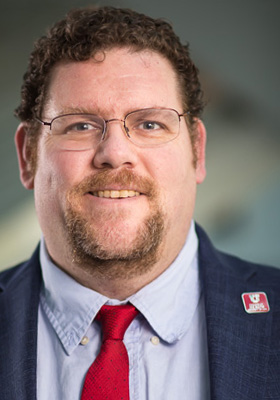
Imagine a cure for diabetes—a disease that afflicts one in 10 Americans. It might not happen in our lifetime, but the work of William Holland, PhD, an associate professor in the Department of Nutrition & Integrative Physiology at University of Utah Health, is accelerating us closer. Major institutions are taking note, and Holland recently achieved a rare feat in the world of academic research: three grant award notifications in a single day.

Diminishing Diabetes Complications
The first is a renewal of funding from the National Institute of Diabetes and Digestive and Kidney Diseases, through the National Institutes of Health. The $1,820,000 grant over the next four years supports Holland’s efforts to explore how to reverse Type 1 diabetes.
While he was an assistant professor at University of Texas Southwestern Medical Center, Holland helped find that blocking a glucagon receptor in a Type 1 diabetic animal was curative—one injection in mice was sufficient to completely cure them of diabetes. The insulin producing beta cells grew back so quickly that the mice needed no further treatment.
Moving forward, Holland is trying to determine how that occurs so it can be translated safely to treatment of diabetes in humans, avoiding troublesome side effects like liver toxicity and hypertension.
“If you can get just a fraction more insulin producing beta cells in a patient, that will greatly diminish a lot of the complications of diabetes,” Holland said. “If their insulin production works, it will help prevent hypoglycemic episodes, neuropathy, vascular disease, heart disease, and so on. Very few people die of diabetes; they die of complications of diabetes.”
A Gene-ius Way to Predict Disease Vulnerability
The second grant is from the American Diabetes Association for $200,000 per year for three years. It will allow Holland to continue to research how to use genetics to provide precision therapies for individuals suffering from diabetes and heart disease.
Hyperceramidemia means your blood has too many lipids called ceramides. Research into the condition involves genetic sequencing to determine which genes regulate these toxic lipids that predict diabetes and heart disease.
Building off a collaboration with a colleague at the University of Wisconsin, Holland is studying multi-generational human genetic data from volunteers at the University of Utah. The Wisconsin collaboration demonstrated that small snippets of DNA can be used to identify ceramide levels based on a specific gene segment.
Today, Holland’s team measures the ceramides and genetic sequencing of patients prone to disease. They examine the genes that were identified in a mouse to see if they correlate to disease and toxic lipid levels in humans.
“One of the things you can get out of this is the ability to genotype a person to determine their risk for diabetes or heart disease in childhood,” Holland said. “If so, we can intervene to make sure that never becomes a problem—like avoiding a diet high in saturated fat.”
During this research, Holland identified what he believes is the first case of “familiar hyperceramidemia,” a family with 64% of its members receiving dialysis. This family has a mutation in adiponectin, meaning they have a lesion in the gene that causes a high level of ceramide in their bloodstream.
Holland’s team continues to determine if this genetic lesion results in high risk for diabetic kidney disease. The study of these rare genetic instances can help determine the drugs that might be useful for an entire class of people prone to diabetes.
Small Steps Toward a Big Cure
Finally, Holland received notification of a two-year research award from SymbioCellTech, LLC. This grant helps fund his lab’s research on transplanting and evaluating human neo-islets.
Islets are clusters of insulin-producing beta cells. When transplanted, they can release insulin to control blood glucose. SymbioCellTech is a biotechnology company based in Utah that is working to cure diabetes through a patented stem-cell therapy involving neo-islets.
This research will specifically benefit patients who are transplant recipients—a specific immune rejection which causes Type 1 diabetes also makes transplanted islets prone to immune destruction. Holland’s collaboration with SymbioCellTech aims to help overcome this treatment barrier.
Perhaps most impressively, Holland is the principal investigator on all three of the grants that received over $2.7 million in total funding. He earned a PhD in biochemistry from the University of Utah and completed his degree research with Scott Summers, PhD, the current chair of the Department of Nutrition & Integrative Physiology. Like Summers, Holland is motivated to cure diabetes due to a history of the disease in his family: his mother and grandfather both suffered severe complications.
“My goal is to change the limitations around diabetes detection and treatment,” Holland said. “I know how long everything takes, so my goal is to change the future for my children and nieces so they grow up with more health and less medicine."
By Sarah Shebek